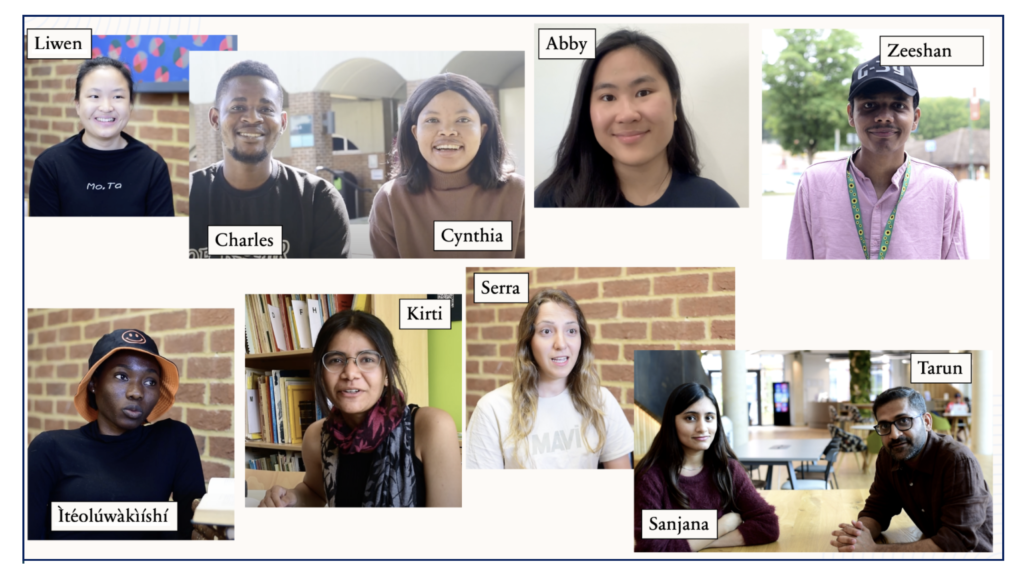Sussex hosts a large group of international students and group work is an excellent way of sharing ideas and experiences from different parts of the world. Successful group work enhances the already rich academic material and facilitates a more holistic understanding.
Student quote from the focus group: Supporting the International Student Experience at Sussex and Beyond 2024
What is inclusive group work
Inclusive group work is designed by a tutor in a course or specific module with ground rules that ensure inclusivity and equality. A carefully designed work plan for a group ensures the inclusion of students who may otherwise be on the periphery of the learning community, perhaps because their characteristics are different from the mainstream cohort.
Group work can be called inclusive when everyone is part of the conversation and can contribute to the output. An inclusive group is designed to ensure that language differences, cultural differences, and learning differences are not barriers to participation. To make group work inclusive, the teacher may need to develop the students’ ability to perceive differences within the group positively and approach any barriers that arise from these differences with an open-minded, reflective, and problem-solving approach. This blog post provides guidance on making group work inclusive. It was co-created by colleagues from Educational Enhancement and the University of Sussex postgraduate students who took part in the project: Supporting the International Student Experience at Sussex and Beyond.

Why is inclusive group work important?
The University of Sussex has a diverse student population, and group work is an excellent way of sharing different ideas and experiences. Inclusive group work promotes an environment of collaboration, rather than competition, in which students engage with the work process together. Additionally, inclusive group work develops valuable skills such as organization, leadership, cooperation, delegation, effective communication, confidence, and cultural understanding. These skills are hugely beneficial for students when they graduate from university, supporting their future endeavors, whether in employability or social situations. Working effectively in diverse groups can be challenging and rarely happens automatically. To avoid cultural segregation in class and to get students truly collaborating with one another, group work needs to be structured by the tutor. Our guidance and resource below will support you in structuring inclusive group work.
How to facilitate inclusive group work
Inclusive group work involves active participation from all members, clear communication, and a collaborative effort to achieve shared goals. Each member should feel included and valued, contributing their unique perspectives and skills.
Please note that if there is a summative assessment related to this group work, then you may also wish to read the University’s guidance on group work for assessments.
These six steps will help you facilitate inclusive group work:
- Assign students to groups to avoid segregation within the class. Please see setting up groups for further information.
- Establish group etiquette to help ensure your groups have a healthy dynamic. This etiquette can be co-created with your students. But you may want to use this etiquette guidance as a starting point.
- Set an agenda for each meeting to help maintain focus and productivity within the group. We have created an agenda template that you can give to your students for each meeting. Feel free to adapt the template according to your preferences.
- Allocate roles for each meeting. To help meetings run smoothly, each meeting should have a chair and a notetaker. The chair will keep the meetings running to time, maintain a focus on goals, ensure all participants can contribute, and summarise the output for the meeting.
- Check your groups are inclusive. This inclusivity checklist is a list of factors for you to consider when setting up your study groups.
- Speak to your students about establishing and maintaining inclusive groups. Alongside the information you provide about group etiquette, you will also need to speak to your students about how they can ensure their group dynamics remain inclusive. The following information supports students with maintaining inclusivity within their groups.
Supporting literature
Boyd, T., Harz, D. and Besche, H. (2024) “The role of inclusion in collaborative learning,” Medical Science Educator, 34(4), pp. 909–913. https://doi.org/10.1007/s40670-024-02045-5.
Oprandi, P. (2018) “5 ways to make groupwork work in your teaching,” Educational Enhancement, 30th October [blog]. Available at: https://blogs.sussex.ac.uk/tel/2018/10/30/5-ways-to-make-groupwork-work-in-your-teaching/ (Accessed: 18/08/2024).
University of Reading. Making the Most of Group Work. Available at: https://sites.reading.ac.uk/curriculum-framework/wp-content/uploads/sites/35/2022/04/Making-the-most-of-group-work-A-guide-for-staff-2022.pdf (Accessed: 18/08/2024).


[…] Making group work inclusive […]